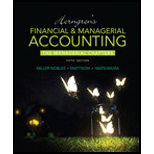
You are planning for an early retirement. You would like to retire at age 40 and have enough money saved to be able to withdraw $220,000 per year for the next 30 years (based on family history, you think you will live to age 70). You plan to save by making 20 equal annual installments (from age 20 to age 40) into a fairly risky investment fund that you expect will earn 8% per year. You will leave the money in this fund until it is completely depleted when you are 70 years old.
Requirements
- 1. How much money must you accumulate by retirement to make your plan work? (Hint: Find the present value of the $220,000 withdrawals.)
- 2. How does this amount compare to the total amount you will withdraw from the investment during retirement? How can these numbers be so different?
Want to see the full answer?
Check out a sample textbook solution
Chapter 26 Solutions
Horngren's Financial & Managerial Accounting, The Managerial Chapters (6th Edition)
Additional Business Textbook Solutions
Operations Management: Processes and Supply Chains (12th Edition) (What's New in Operations Management)
Marketing: An Introduction (13th Edition)
Foundations Of Finance
Intermediate Accounting (2nd Edition)
Horngren's Accounting (12th Edition)
- A retail company reports the following financial data: • Revenue: $1,200,000 • Expenses: $800,000 • Net income: $400,000 • Assets: $900,000 • Liabilities: $200,000 • Average equity: $700,000 What is the company's return on equity (ROE) in percentage terms, rounded to two decimal places?arrow_forwardEfford plc has the following equity capital at the year end. (Click here to view the financial data.) In addition, the company has 400,000 £1 8% preference shares in issue. The board of directors wishes to eliminate the company's reserves. It has decided to make an immediate 1-for-2 bonus issue of ordinary shares. Following the issue, an annual dividend will be paid to shareholders. What will be the required: 1. Transfer from revenue reserves to effect the bonus issue. £50,000 (Type an integer.) 2. Dividend per ordinary share. (Expressed as £ per share) £ 0.10 per share (Round to two decimal places as needed.) Data table £ Ordinary shares of £0.50 each 200,000 Share premium 50,000 General reserve 80,000 62,000 Retained profits 392.000arrow_forwardA technology company earns a profit of $8 per share. If the stock is currently selling for $96 per share, what is the current price/earnings (P/E) ratio? a) 6 b) 10 c) 12 d) 18arrow_forward
 EBK CONTEMPORARY FINANCIAL MANAGEMENTFinanceISBN:9781337514835Author:MOYERPublisher:CENGAGE LEARNING - CONSIGNMENT
EBK CONTEMPORARY FINANCIAL MANAGEMENTFinanceISBN:9781337514835Author:MOYERPublisher:CENGAGE LEARNING - CONSIGNMENT
